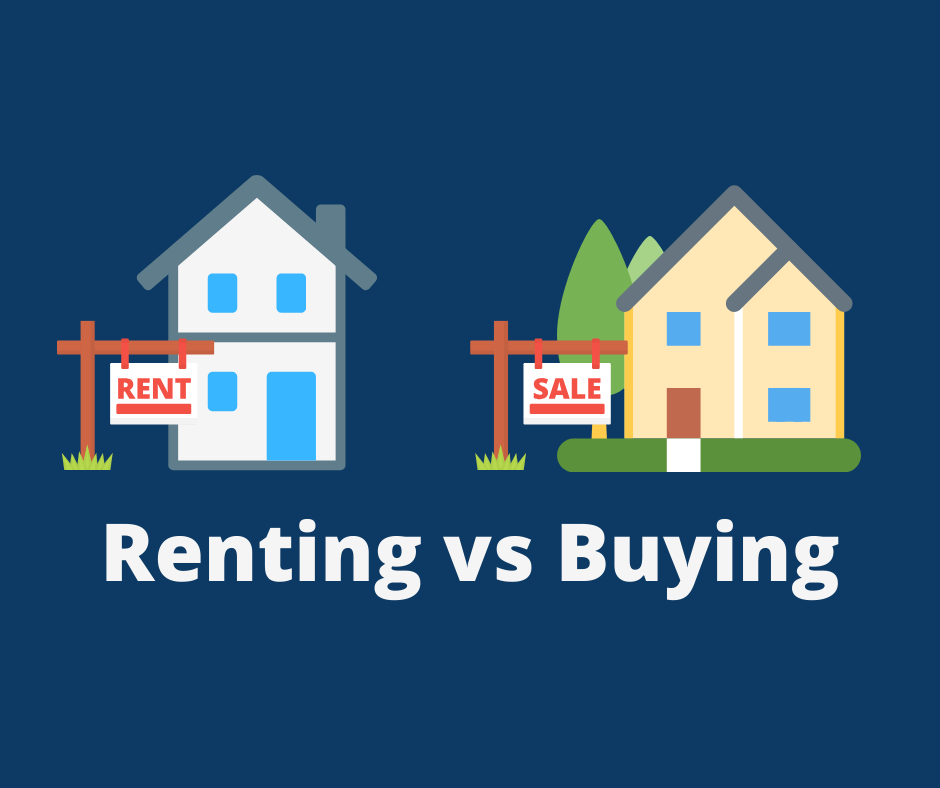Renting vs. Buying: Which One is Right for You?

Renting vs Buying: Which One Is Right For You?
A Comprehensive Guide for First-Time Home Buyers, Military Families, and Renters Ready to Own
Deciding between renting and buying a home is one of the most important financial and lifestyle choices you'll ever make. Whether you're a first-time home buyer trying to navigate the complexities of the market, a military family PCSing to San Antonio, or a renter considering taking the plunge into homeownership, the decision can feel overwhelming. In this detailed guide, we'll break down the pros and cons of each option, dispel common myths, and provide actionable advice to help you determine which path suits your unique circumstances best.
Understanding the Renting vs Buying Debate
Before diving into the nitty-gritty details, it’s important to understand the fundamental differences between renting and buying a home.
What Does Renting Mean?
- Flexibility: Renting provides the flexibility to move frequently without the burden of property maintenance or market fluctuations.
- Lower Upfront Costs: Generally, renting requires a security deposit and the first month’s rent, which is significantly less than a down payment.
- Limited Responsibility: As a renter, the landlord usually handles maintenance and repairs.
- No Equity Building: Monthly rent payments do not build equity or contribute to your net worth.
What Does Buying Entail?
- Equity Building: Every mortgage payment you make is an investment in your future, gradually building equity in your home.
- Stability and Control: Homeownership offers the stability of fixed monthly payments (if you choose a fixed-rate mortgage) and the freedom to customize your space.
- Tax Benefits: Homeowners can often take advantage of tax deductions related to mortgage interest and property taxes.
- Upfront Investment: Buying a home requires a significant upfront investment, including a down payment, closing costs, and other fees.
- Maintenance Responsibilities: As a homeowner, you'll need to budget for regular maintenance and unexpected repairs.
Who Are You? Tailoring the Decision to Your Situation
First-Time Home Buyers
For many first-timers, the idea of owning a home is both exciting and daunting. You might be wondering:
- Is it financially feasible to buy right now?
- How will owning a home affect my lifestyle?
- Am I ready to take on the responsibilities of homeownership?
If you're ready to invest in your future and are prepared for the responsibilities that come with owning a home, buying might be the right choice. However, it's crucial to carefully assess your current financial situation, future career stability, and personal needs.
Military Members PCSing to San Antonio
Military families face unique challenges when it comes to relocating and securing stable housing. For those PCSing (Permanent Change of Station) to San Antonio:
- VA Loans: As a military member, you likely qualify for a VA loan, which can offer competitive interest rates and reduced or zero down payment options. This benefit can significantly ease the transition from renting to buying.
- Local Insights: San Antonio is a vibrant city with a mix of urban excitement and suburban tranquility. Choosing the right neighborhood is essential, and local resources are available to help military families make an informed decision.
- Flexibility vs. Stability: Consider how long you plan to stay in the area. If your station assignment is short-term, renting might be more practical. But if you're looking for a stable, long-term base, buying could be a smart investment.
Renters Becoming Homeowners
For those transitioning from renting to owning, the decision often revolves around financial readiness and lifestyle goals:
- Budgeting and Savings: Do you have enough saved for a down payment and closing costs? Are you prepared for the additional expenses of home maintenance?
- Long-Term Goals: Is building equity and having the freedom to modify your living space important to you?
- Market Conditions: Understand your local market trends—are home prices rising, or is there potential for growth?
Financial Considerations: Affordability, Down Payments, and VA Loans
One of the most significant factors in the renting vs buying debate is the financial aspect. Let's break down the critical financial considerations:
Comparing Monthly Expenses
- Renting: Your monthly rent might be lower than a mortgage payment, but remember that rent is money you won’t get back. It’s a recurring cost that doesn’t build equity.
- Buying: While a mortgage might be slightly higher than rent, you’re investing in your future. Over time, building equity can lead to significant financial gains.
Upfront Costs: Down Payment and Closing Costs
- Down Payment: Traditional mortgages often require a 10-20% down payment. However, various programs, especially for first-time buyers or veterans, can lower this barrier.
- Closing Costs: These can include fees for appraisal, inspections, and processing. It’s important to budget for these costs in addition to your down payment.
- VA Loans for Military Buyers: Military members may benefit from VA loans, which can reduce or eliminate the need for a down payment and offer favorable interest rates. This makes buying much more accessible for those who serve.
Long-Term Investment vs. Short-Term Expense
- Equity and Appreciation: Owning a home means that you’re building equity over time. As property values rise, your investment can grow substantially.
- Renting as a Short-Term Solution: If you’re unsure about your long-term plans or anticipate changes in your personal circumstances, renting can provide the flexibility you need without tying up a large sum of money.
Tools to Help You Decide
- Rent vs. Buy Calculators: Numerous online calculators can help you compare the long-term costs of renting versus buying. These tools consider factors such as mortgage interest, property taxes, insurance, and maintenance costs to provide a clear picture of what’s best for you.
Lifestyle and Flexibility: Weighing the Pros and Cons
While the financial considerations are critical, your lifestyle and long-term goals also play a major role in the decision between renting and buying.
Advantages of Renting
- Flexibility: Renting is ideal if you’re not ready to settle in one location or if your job or personal life may require frequent moves.
- Lower Maintenance: When you rent, your landlord or property management is responsible for repairs and maintenance, freeing up your time and reducing unexpected costs.
- Simpler Commitment: Renting offers a more straightforward process with fewer upfront costs and no long-term commitment to a property.
Benefits of Buying
- Stability: Owning a home offers stability and permanence. You can settle into a community, establish roots, and make long-term plans.
- Customization: Homeownership gives you the freedom to renovate and personalize your space to suit your style and needs.
- Equity Building: With each mortgage payment, you’re investing in your future. Over time, the property can appreciate, providing a financial safety net or a source of retirement income.
Key Considerations for a Balanced Decision
- Future Plans: How long do you plan to stay in the area? If you see yourself living in one place for several years, buying may be more advantageous.
- Risk Tolerance: Are you comfortable with the responsibilities of homeownership, including unexpected repairs and maintenance costs?
- Market Trends: Local real estate market trends can also influence your decision. In some areas, home prices are rising rapidly, making early ownership a smart investment.
Overcoming Common Home-Buying Myths
There are many myths about buying a home that can cloud your judgment. Here are a few common ones and the truths behind them:
-
Myth #1: You Need a 20% Down Payment to Buy a Home.
Truth: Many loan programs, including VA loans and FHA loans, require much lower down payments. In fact, some programs offer down payments as low as 3-5% for qualified buyers. -
Myth #2: Renting Is Always Cheaper Than Buying.
Truth: While monthly rent might be lower, renting doesn’t build equity. Over time, the cost of renting can add up, and you miss out on potential property appreciation. -
Myth #3: Homeownership Is Only for the Wealthy.
Truth: With various financing options and assistance programs available, owning a home is within reach for many people—even first-time buyers. -
Myth #4: It’s Better to Wait Until You’re Perfectly Ready.
Truth: There’s rarely a “perfect” time to buy. Markets fluctuate, and personal circumstances change. Often, taking the plunge with the right guidance can set you on the path to financial growth.
Navigating San Antonio: A Special Guide for Military Members PCSing
San Antonio is a city rich in culture, history, and opportunity—making it an attractive destination for military families. If you’re PCSing to San Antonio, here’s how to make the most of your transition:
VA Loans and Financial Advantages
- Zero Down Payment Options: Many VA loan programs allow you to buy a home with little to no down payment, easing the financial burden.
- Competitive Interest Rates: VA loans often come with lower interest rates, saving you money over the life of your mortgage.
- No Private Mortgage Insurance (PMI): Unlike conventional loans, VA loans do not require PMI, which can result in significant savings each month.
Choosing the Right Neighborhood
- Family-Friendly Areas: Look for neighborhoods with good schools, parks, and community centers if you have children.
- Proximity to Military Bases: Consider areas that offer easy commutes to nearby military installations.
- Community Support: Seek out neighborhoods with active homeowner associations and community support groups—resources that can be particularly helpful during your transition.
Local Resources for Military Buyers
- Real Estate Agents Specializing in Military Relocation: Look for agents who understand the unique needs of military families.
- Community Programs: San Antonio offers various programs and incentives to help military families settle in and thrive.
Real-Life Success Story: From Renting to Owning
Consider the story of Jessica and Mark, a young couple who spent years renting in a bustling urban neighborhood. Tired of paying rent and watching their hard-earned money disappear each month, they decided to explore homeownership. With the help of a dedicated real estate agent who specialized in first-time buyers, they discovered a modest home in a quiet suburb that not only fit their budget but also provided room for future growth.
Jessica, who had been hesitant at first, realized that owning a home was not just about having a roof over their heads—it was about building equity and creating a stable environment for their future family. Today, Jessica and Mark are not only enjoying the freedom to customize their space but also reaping the long-term financial rewards of their investment. Their success story is a testament to the fact that, with the right guidance and preparation, the leap from renting to owning can be a life-changing decision.
Making the Decision: Practical Tips and Tools
Deciding between renting and buying doesn’t have to be a leap of faith. Here are some practical tips and tools to help you make an informed decision:
Rent vs. Buy Calculators
- Online Tools: Use reputable rent vs. buy calculators to compare your monthly costs and long-term financial benefits. These calculators consider factors like mortgage rates, property taxes, insurance, and maintenance costs.
- Scenario Analysis: Input different scenarios to see how factors such as interest rate changes or property appreciation could affect your decision.
Assessing Your Financial Health
- Budget Review: Take a hard look at your current budget. Consider your monthly expenses, savings, and how much you can realistically allocate towards a mortgage payment.
- Credit Score Check: A good credit score is crucial for securing favorable mortgage rates. If your credit needs improvement, take steps to boost your score before applying for a loan.
- Down Payment Savings: Evaluate your savings for a down payment and consider if you might benefit from programs that offer assistance to first-time buyers.
Questions to Ask Yourself
- How long do I plan to stay in this location?
If you expect to move within a few years, renting might be the better option. - Am I prepared for the added responsibilities of homeownership?
Consider whether you’re ready to handle maintenance, repairs, and the fluctuations of the housing market. - What are my long-term financial goals?
If building equity and investing in your future is a priority, buying may be the right choice.
Tips for First-Time Home Buyers
For first-time buyers, the process can seem complex. Here are some targeted tips to simplify your journey:
- Get Pre-Approved: Start by getting pre-approved for a mortgage. This not only clarifies your budget but also strengthens your position when you make an offer.
- Work with a Trusted Real Estate Agent: A knowledgeable agent can guide you through the process, help you navigate local markets, and ensure you’re aware of all the potential pitfalls.
- Attend Homebuyer Seminars: Many communities offer seminars and workshops that cover everything from financing options to negotiating the best deal.
- Explore Assistance Programs: Look for state and local programs that offer financial assistance to first-time buyers, including down payment assistance and reduced interest loans.
- Research the Neighborhood: Don’t just fall in love with a property—make sure the neighborhood fits your lifestyle and long-term needs.
Key Considerations for Military Buyers in San Antonio
If you’re a military member relocating to San Antonio, here are additional points to consider:
- Understand Your VA Loan Benefits: Research how VA loans can minimize your out-of-pocket expenses. Speak with a lender who specializes in military financing.
- Plan for PCS Timelines: When PCSing, timing is crucial. Factor in how quickly you need to move and the local market’s pace.
- Utilize Military Relocation Resources: Organizations such as the Military Housing Assistance Office can provide valuable insights and local contacts.
- Community Integration: Look for neighborhoods with strong community ties and support networks for military families, which can make your transition smoother.
Strong Calls to Action: Taking the Next Step
Deciding whether to rent or buy is a pivotal moment in your life, and you don’t have to navigate it alone. Here are some action steps to help you move forward:
- Schedule a Free Consultation: Our team of experienced real estate professionals is here to answer your questions and guide you through the decision-making process. Contact us today to schedule a free consultation and start planning your future.
- Download Our Comprehensive Guide: If you’d like even more detailed information, download our free resource on “Renting vs Buying: Key Considerations for Every Buyer.” It’s packed with actionable tips, expert advice, and tools to help you make the best decision.
- Join Our Webinar: Sign up for our upcoming webinar where we dive deep into the financial and lifestyle aspects of renting vs buying. Learn directly from experts and get your questions answered in real time.
- Connect with a Local Expert: Whether you’re new to homeownership or a seasoned buyer, local market trends and neighborhood insights are essential. Reach out now to connect with a local expert who can tailor their advice to your unique needs.
Frequently Asked Questions (FAQs)
Q: Is renting really cheaper than buying?
A: While renting can have lower monthly expenses, it doesn’t contribute to building equity. Over time, buying a home—especially with favorable financing options like VA loans—can be a wise long-term investment.
Q: What if I’m not sure how long I’ll live in the area?
A: If your plans are uncertain, renting offers flexibility. However, if you’re considering a long-term stay, buying may provide stability and financial benefits through equity building.
Q: How do VA loans work for military buyers?
A: VA loans are designed to make homeownership more accessible for military members. They often require little to no down payment, offer competitive interest rates, and do not require private mortgage insurance, making them an attractive option for eligible buyers.
Q: What should I look for in a neighborhood?
A: Consider factors such as proximity to schools, community amenities, safety, and overall neighborhood vibe. If you’re a military family, proximity to bases and community support can be especially important.
Conclusion: Your Future, Your Choice
The decision between renting and buying ultimately comes down to your personal circumstances, financial health, and long-term goals. Whether you’re a first-time buyer, a military family navigating a PCS move, or a renter contemplating the leap into homeownership, this guide is designed to empower you with the knowledge you need to make an informed decision.
Remember, there is no one-size-fits-all answer—only the choice that best aligns with your life and aspirations. If you’re ready to take the next step or need personalized advice, our team of experts is here to help.
Don’t wait—your future home awaits. Schedule your free consultation today and start turning your dreams into reality!
Categories
Recent Posts






